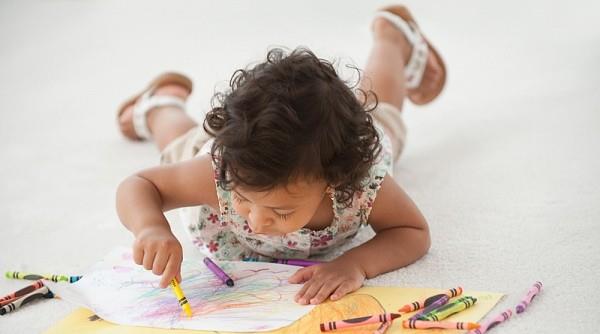When assessing the developmental time of premature babies, parents should count from the moment of pregnancy, not from the date of birth.
Things that affect a child's development
1. Baby's temperament
To some brave babies, nothing seems to worry or frighten them: they can climb on high chairs or tables by curiosity about something and then they can jump. down right after that without fear. Children with this dynamic character will often walk very early. In contrast, babies are more cautious, they often want to know which is best before doing the rest.
2. Natural ability
Usually, outstanding characteristics of a child will be shown quite early from the age of 1. According to statistics, children who have the ability to speak early can succeed in a job related to literature or rhetoric. But if your child can speak late, you cannot deduce that he or she cannot be successful in these areas when he grows up.

Babies with natural abilities can express it very early.
3. Siblings
Children with older siblings often hit developmental milestones earlier than usual because they have to push themselves to keep up. In contrast, children who are older siblings in the home tend to have later developmental milestones. For example, the younger brother is more likely to be given toys than by older siblings. In these situations, the mother needs interventions such as reminding older children to share toys with her baby, but also do not force the child to do anything too difficult when the baby is not ready.
4. Early birth
Babies born early usually take longer than normal babies to reach developmental milestones. But by about 2 years, these babies can catch up with other babies as usual. According to doctors, when assessing the developmental time of babies born early, parents should calculate from the moment of pregnancy, not from the date of birth. Because a baby born 3 months early will reach the developmental milestone at 6 months after birth instead of 3 months after birth as a full term baby.
Signs of growth retardation
Here's what parents should keep in mind when monitoring their child's development:
Your baby's developmental milestones are too slow. For example, a baby is 15 months old and doesn't know what words to say or can not walk; the baby feeling is always wrapped up in a baby's own world; The baby does not respond, does not turn to look at his mother when he enters the room or calls out his name.
A certain milestone of the baby's development is 2 months or more slower than normal. For example, your baby is 17 months old and cannot walk or is 7 months old but can't smile. It seems that he does not understand or react when you talk to him. In about 8 to 12 months, most babies will react to find their favorite items such as stuffed animals, pets ... when you ask them where they are, or at least they will look in the right direction. that object. Around 12 to 15 months, your baby will begin to respond to simple requests. For example, ask a one year old baby to get you his shoes, he will do it.
In fact, parents are often too worried about their baby's developmental milestones, so they often focus on checking their child's "growth graph" rather than joining their baby on the journey. to those interesting developments.
How to stop those worries?
See what you can find on the Internet when your child hasn't reached the usual milestones. But in general, this seemingly unlimited information, so you need to be alert to filter out the information you need. At the same time, you can consult your doctor.
Do not compare your child with other children. There is not enough reason to say that the differences in your child's developmental milestones are related to whether or not he is competent. Whether the children of someone you know can roll, crawl, walk, or speak in front of your baby, you can say that your child loses their advantage.
For situations where you find signs that your baby's delay in reaching developmental milestones is interrelated or the growth milestones are months slower than usual, quickly bring in. Baby comes to the doctor for a more accurate check.
In short, in order for the baby to have good first steps of development, in addition to understanding about the baby's important milestones, it is also necessary to spend a lot of time showing affection, interest, and play with. babies let babies feel their parents' love and encouragement. This helps to create a good bond between parents with their children and is a good foundation for the baby to develop steadily in the future.












